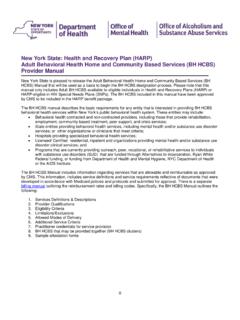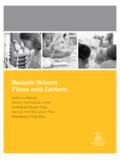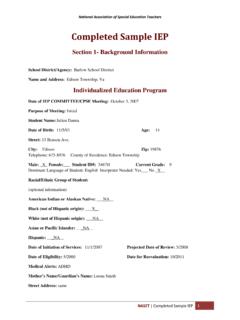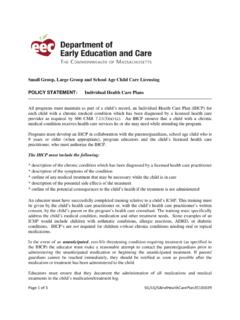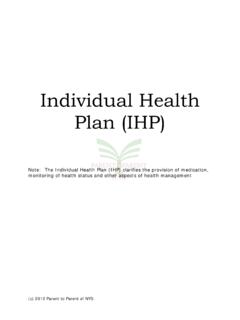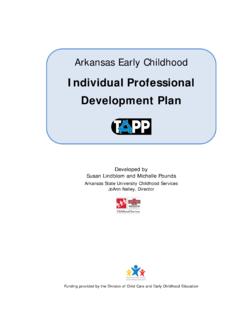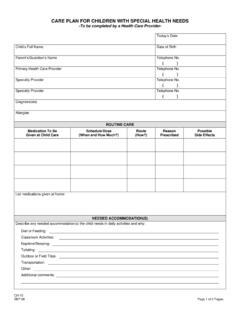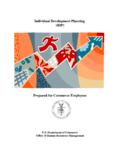Transcription of The Planning Process: Initial Steps to Creating the ...
1 Chapter 2 January 2013 1 Chapter Two The Planning Process: Initial Steps to Creating the Individualized Recovery plan The process of developing a person-centered Individualized Recovery plan (IRP) is supported by the development of a partnership and process for collaboration between the Personalized Recovery Oriented Services (PROS) practitioner and the individual. The practitioner and the individual must enter into a supportive yet dynamic interaction that explores and examines who the person really is within the context of his or her strengths, how the mental illness has impacted his or her ability to function and attain the things he or she would like to achieve, and how PROS Services can be useful in the recovery process. The person-centered Planning process should result in the development of the individual s service plan or Individualized Recovery plan (IRP).
2 In taking the Initial Steps of the Planning process, it may be helpful to follow the ordered Steps presented in Adams and Grieder s Logic Model (2005), depicted in the graphic below. (Adams & Grieder, Treatment Planning for Person-Centered Care, 2005) The Logic of Building a PlanThe Logic of Building a PlanRequest for servicesAssessmentServicesUnderstandingG oalsObjectivesOutcomesPrioritizationStre ngths & BarriersChapter 2 January 2013 2 These Steps , when followed in sequence, can guide the PROS practitioner and the individual through the person-centered Planning process that will eventually result in an IRP that both supports the individual s recovery vision and serves essential administrative and clinical functions. Beginning with a request for PROS services, each step builds on the one that precedes it skipping a step or completing the Steps out of order can potentially undermine the process and compromise the end result.
3 The Planning Process and eventual creation of the Individualized Recovery plan can be organized into several logical Steps that follow in order and include: a) Assessment b) Formulation of an integrated understanding of the individual c) Prioritization of areas to be addressed d) Establishment of recovery goals and a vision for the future e) Identification of strengths and barriers to accomplishing the goal f) Creation of objectives that help to overcome barriers g) Description of interventions/activities that reflect a range of evidence-based and emerging best practices h) Evaluation of progress and outcomes (including the evaluation of discharge/transition criteria) Required PROS Assessments and the IRP Process In PROS, the Assessment Service is a comprehensive, ongoing process rather than a static event. It should be conducted within the context of an individual s self identified needs and goals, ethnic identity, religious identity, and cultural identity.
4 Assessment also serves as an opportunity for the individual and the practitioner to develop trust in and rapport with each other. Using trust and rapport as a foundation, they can then begin to work together to identify and understand the person s life role goals and discover how PROS services can help the person attain these. Chapter 2 January 2013 3 In PROS, Assessment is an active and interactive service rather than a static collection of data and information. Assessments consider and identify the person s strengths and abilities, his or her life role goals, and the barriers and challenges that the person s mental illness creates. The PROS practitioner engages the individual in thinking and talking about his or her strengths and abilities while acknowledging the barriers created by mental illness that he or she encounters. After the individual is enrolled in PROS, a number of assessments are provided by the multi-disciplinary team members.
5 Required assessments are determined by the specific PROS Components in which the individual enrolls. PROS assessments are designed to review and determine an individual's level of functioning, the past benefits of participating in mental health services, and the individual s ability to function in specific life roles. The Role of the Assessment Service in IRP Planning Process The Assessment Service in PROS enables the individual and the practitioner to focus on the individual s purpose for participating in the program. A critical piece of both the Adams and Grieder Logic Model and the IRP Planning Process, the Assessment Service is used to identify the individual s strengths and abilities as well as to identify the barriers to optimal functioning PROS Component - If a person enrolls in the following components: These are the required Assessments: Clinic Psychiatric Assessment health Assessment Community Rehabilitation Psychosocial and Support (CRS), Psychiatric Rehabilitation with Vocational Focus Intensive Rehabilitation (IR), Alcohol & Substance Abuse Screening, including Nicotine Ongoing Rehabilitation and Addiction Support (ORS) ORS Only Psychiatric Rehabilitation with Vocational Focus Chapter 2 January 2013 4 that have been created by the person s mental illness.
6 Simply engaging in an honest and reflective conversation about these issues lays the groundwork for establishing an understanding of the individual as a whole person someone who is not defined by mental illness but rather someone who is overcoming a challenge to attaining his or her goals and aspirations. Assessment in PROS is a continuous, comprehensive and collaborative process that engages the individual and the practitioner in an evaluation of the ways the person s abilities can be used to overcome the challenges created by his or her mental illness. The person s active contribution to and participation in this process is a key factor in assuring that the Assessment is completed with a person-centered focus. Using strengths-based, recovery-focused language, the practitioner is able to develop a deep understanding of the individual as a whole person and engages the individual in a collaborative conversation about what is most important in the person s life.
7 In collaboration with the practitioner, the person is supported to identify his/her hopes, dreams, and goals as well as to examine the ways mental illness has created barriers and challenges that have impacted the achievement of these goals. Each PROS Assessment concludes with an Interpretative Summary in a narrative format that identifies the person s strengths, the barriers created by the mental illness, the life goals the person has identified, and how the person hopes to achieve these goals through his or her own talents and abilities and participation in PROS Services. This narrative, Interpretative Summary becomes an essential building block in the development of the Individualized Recovery plan and will be examined in detail in Chapter 3. Documenting Medical Necessity: Balancing Strengths and Barriers How do you balance the assessment of strengths with a thorough assessment of barriers which are interfering with the attainment of valued life role goals?
8 Documentation of medical necessity is essential as part of the person-centered Planning process. Although person-centered Planning strives to focus on a person s strengths, the Assessment Service must also consider roadblocks which interfere with life goals and take the shape of disability-related limitations, experiences, or symptoms. Barriers must be acknowledged, alongside assets and strengths in order to justify care by supporting the medical necessity of professional support. Obtaining a clear understanding of what is getting in the person s way in the recovery process informs the various professional interventions and natural supports. What makes a PROS IRP unique, however, is that mental health barriers do not become the exclusive and dominant focus of the Chapter 2 January 2013 5 plan but rather are viewed as things that interfere with as opposed to prevent - the person s attainment of larger life goals.
9 The person accomplishes recovery by addressing these barriers ( , symptoms of mental illness), so that he or she is able return to work, finish school, be a better parent, pursue a hobby, etc. In a recovery-focused context, the person s mental illness becomes something that is managed like any other chronic illness -- by actively acknowledging and overcoming its manifestations. In discussing the barriers the person encounters, it is important to be specific and to distinguish between barriers that are created by the person s mental illness and ways that the mental illness contributes to external, environmental barriers. Consider the following example of the ways a person s mental illness creates barriers to his/her achievement of specific life role goals. Jane, who is a PROS participant, has a valued life role goal of working with children in a pre-school environment.
10 Most positions in this field require that the person have a General Education Diploma (GED) or high-school diploma. Jane has not been able to earn her GED or high school diploma because her mental health symptoms make it difficult for her to concentrate enough to complete coursework and to negotiate the social environment of high school. A deficit-based service plan might identify Jane s goal as improve symptoms or increase concentration or even decrease paranoia. In a person-centered PROS IRP, however, the goal is stated simply, using the Jane s own words, , I want to work with kids someday, and Services must assist individuals to overcome barriers related to the mental health condition that is preventing goal achievement. Services are considered medically necessary when they enable individuals to utilize inherent strengths and supports to overcome barriers caused by a mental health condition.

